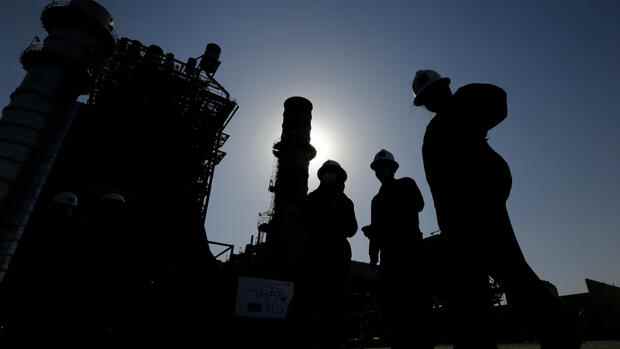Germany is to receive liquid gas from the United Arab Emirates.
(Photo: AP)
Abu Dhabi Germany and the United Arab Emirates are expanding their energy partnership. During the visit of Chancellor Olaf Scholz to Abu Dhabi, the governments of both countries signed a framework agreement that was accompanied by numerous business deals.
The energy group RWE agreed on a contract for the first delivery of liquefied natural gas (LNG) at the end of December. The agreement with the state-owned Abu Dhabi National Oil Company (ADNOC) provides for an initial delivery of 137,000 cubic meters of LNG in December, which will come to Germany via a floating import terminal in Brunsbüttel. “In addition, ADNOC has reserved a number of other LNG cargoes exclusively for German customers in 2023,” the joint statement from both governments reads. It is also mentioned that the Hoyer company intends to import up to 250,000 tons of diesel per month.
The December delivery is only a fraction of what Germany received from Russia in the past: in 2020, the Federal Republic imported around 56 billion cubic meters of natural gas from the country via pipelines. 137,000 cubic meters is 0.00024 percent of this amount.
ADNOC has also made a number of agreements with German companies, including Steag and Aurubis, the statement said. It is said to be about deliveries of low-carbon ammonia, a carrier fuel for hydrogen. The first of these loads had already arrived in Hamburg at the beginning of September.
Top jobs of the day
Find the best jobs now and
be notified by email.
Both countries wanted to explore further possibilities for cooperation along the entire hydrogen value chain. In addition, the VAE company Masdar is to become more active in the offshore wind markets in the German North and Baltic Seas.
Transformation to a climate-neutral economy
A production capacity of up to ten gigawatts of renewable energies is aimed for by 2030, “provided that the necessary political and regulatory requirements of both countries are met”. “With the “Energy Security and Industry Accelerator (ESIA)” agreement, we are enabling the rapid implementation of strategic lighthouse projects in the priority areas of renewable energies, hydrogen, LNG and climate protection,” said Chancellor Scholz.
The Chancellor emphasized that the negotiations on cooperation in the IT sector with the UAE are very important for future economic cooperation, but also for the transformation to a climate-neutral economy. Referring to the expansion of gas production in the Gulf States, he added: “It is important that such projects are completed everywhere. We have to ensure that the production of liquid gas in the world is advanced enough that the high demand that exists can be met without having to resort to the production capacities that exist in Russia.” That is with all of them associated with gas projects that are emerging all over the world.
The contacts on his trip to Saudi Arabia, the UAE and Qatar served to open up possible additional sources of supply for LNG, but later also for hydrogen, so that Germany was no longer dependent on a supplier. “That won’t happen to us again,” said Scholz, alluding to the extensive Russian gas supplies in the past.
More: Rivals in the cabinet: why the dispute between Habeck and Lindner is escalating
